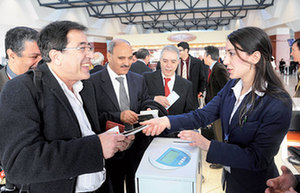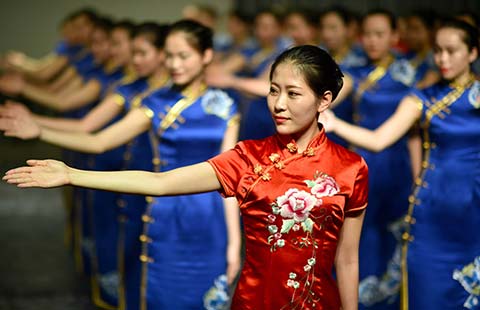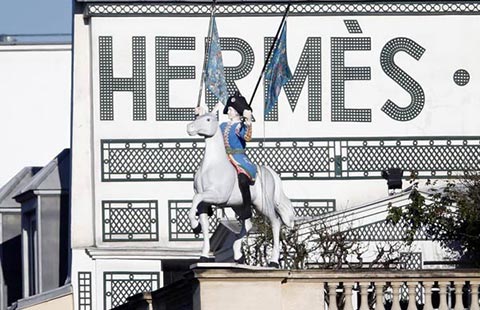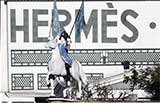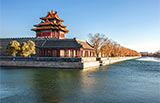'Consistency vital in food and beverage'
By Wang Zhuoqiong (China Daily) Updated: 2014-03-27 08:33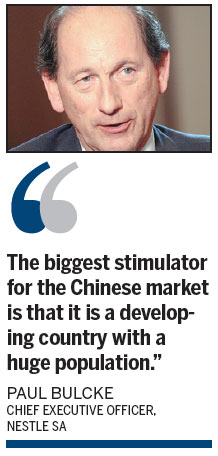
The Chinese economy, among many emerging markets, witnessed a slowdown last year that is expected to continue this year.
But the CEO sees this as a huge opportunity rather than a crisis. He said it is healthy that China's development model is based mostly on internal growth than export growth. "It is soft but more sustainable," he commented.
In 2013 Nestle's sales increased by 2.7 percent to 92.2 billion Swiss francs ($104.6 billion). Meanwhile, its sales growth in China slowed to 27.6 percent, much lower than the 91.4 percent in 2012.
Bulcke said in February that the macro-environment in 2013 was one of soft growth, minimal in the developed world and below recent levels in the emerging markets. "Our response was to increase brand support and to accelerate innovation, to ensure our pricing was sensitive to consumer needs," he said.
The CEO considers it a huge opportunity to be part of the sizable growth of an extremely sizable country.
"The biggest stimulator for the Chinese market is that it is a developing country with a huge population," he said.
In 2013, Nestle's congee brand Yinlu had a particularly strong year, helped by its new premium congees. Another strong performer in China was the adult and senior nutrition milk powder range, Yiyang.
Roland Decorvet, chairman and CEO of Nestle Greater China, said early this month the company is confident about this year because it is focusing on the China economy.
In 2014, in terms of catering, Nestle is changing its strategy to target medium-priced restaurants rather than high-end ones and concentrating on mainstream outlets. "We are focusing more on consumption and less on gifting," he said.
Under Bulcke's leadership, Nestle has developed various brands at different price points, which is considered by observers to be an effective approach in the Chinese market to cope with the current anti-extravagance campaign. The campaign was initiated more than a year ago to curb luxury spending using public funds.
The policy has affected high-end and premium consumer goods, including Nestle's confectionery brand, Hsu Fu Chi, sales of which were flat in 2013.
Bulcke's says the strength of Nestle lies in its different price points and different product segments. Bulcke not only expanded the company's food and beverage empire but also stepped into the new arena of health science.
In February, Nestle announced it will extend its activities to include the field of specialized medical skin treatments through the creation of Nestle Skin Health SA.
The foundation for Nestle Skin Health SA will be Galderma, the joint venture owned by Nestle and the French company The L'Oreal Group. L'Oreal's 50 percent stake in Galderma will be transferred to Nestle as part of a transaction in which Nestle sells part of its shareholding in L'Oreal.
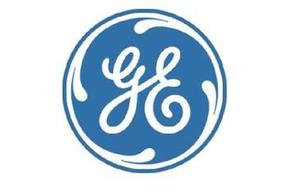 |
- Nestlé continues to donate infant nutrition food to underdeveloped areas
- Nestlé supports breastfeeding and cares C-section breastfeeding
- Nestlé Research Symposium: Nutritional Approaches for Cardiovascular and Metabolic Health
- Company Special: Nestle to expand investment nationwide
- Nestle to invest more in health food sector
- Automaker eyes Russia, Iran markets
- China delists company for violating disclosure rules
- Drone maker DJI to launch nationwide farm services
- Upgraders lead home-buying rush amid bullish sentiment
- Alibaba to soon top Wal-Mart as world’s largest retail platform
- ZTE holds discussions with US on lifting export restrictions
- Apple will release new smaller iPhones
- GM to focus on SUVs and MPVs for growth in China
